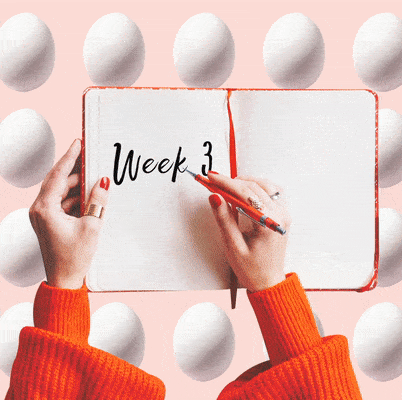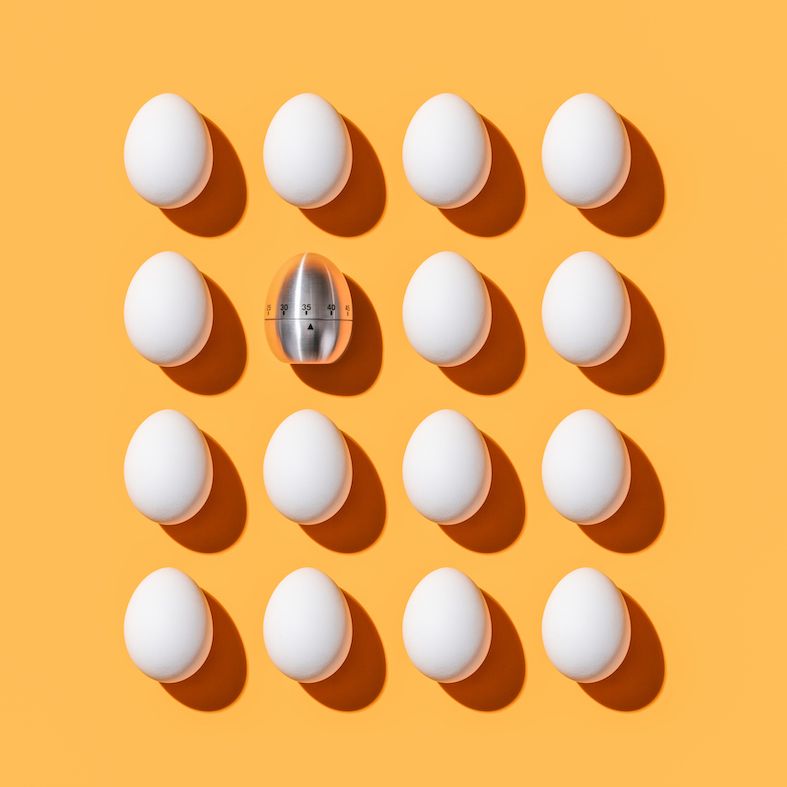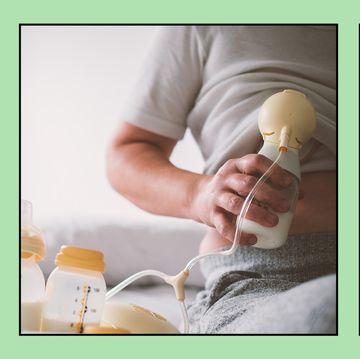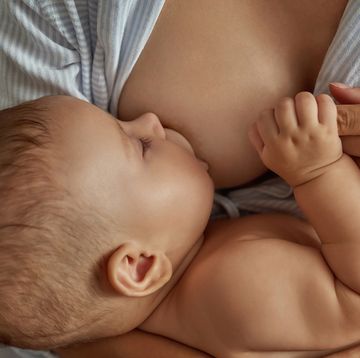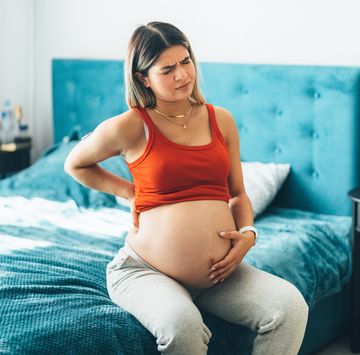The enforced pause the pandemic put on dating and life in general has led to more women than ever wanting to freeze their eggs. This Cosmopolitan writer is one of them. In her three-part diary, she explains why, and what the process is really like for those (thinking of or) going through it.
The most recent diary entry is at the top, so if you're new here, scroll down to read in chronological order.
Week 3: What actually happens when you have your eggs frozen?
I have come to think of egg freezing as a three-act play. The first act is the decision to start the process. This can take weeks or years, depending on the person involved. The second act is the process of getting started, learning to do the injections, and your body reacting to the medication and the routine of blood tests and scans. The final act – the one this diary is about - is where everything starts to feel very real, and the physical and psychological effects of the process crystalise towards the end point of egg retrieval.
For me, the first week of doing the injections was actually much more manageable than I expected. I experienced minimal side effects, and with help and constant communication from the brilliant team at The Fertility & Gynaecology Academy, I found a rhythm and routine to my every-other-day appointments and blood tests that wasn’t too invasive. I still went out for dinners, I had the odd glass of wine, and did some light exercise. Nothing too strenuous but… I led a relatively normal life.
But the second week was different. I had been prepared for this, as your ovaries are stimulated to create more and more eggs, the fatigue I felt was real. A normally energetic person, I found myself in bed by 9pm most nights. I was exhausted and had period-type aches in my womb. All normal, but still a lot to cope with, especially when there’s not much language to explain these things to colleagues or anyone outside your inner friendship circle.
When you have a migraine or period pain, you can tell people why you’re a bit slower than usual. It’s harder to do it with something like this, and I struggled a bit to maintain the façade of ‘fineness’. In the end I told a couple of close colleagues and felt instantly better for it. Even my male boss who was I was worried about telling was incredibly supportive, I wish I’d told him sooner and taken that layer of pressure off myself.
How long the process of ovarian stimulation – the injections – takes differs for every woman. It can be anywhere between 9-15 days. For me, by day 13, my consultant Dr Gorgy, said I was ready to be scheduled for egg collection.
Towards the end, things happen very quickly, so you have to be prepared to clear your schedule at a moment’s notice. When it’s decided you’re at a good point to get the maximum number of eggs collected, you’ll be told to take ‘the trigger’ which is a separate injection you give yourself 36 hours ahead of the eggs being removed under sedation.
In my final appointment, Dr Gorgy told me he was expecting we would get around four eggs from this round. My heart sank a bit. It was a lot less than I was hoping for. Current advice states that to get the most chance of being able to use your eggs to get pregnant later in life, you need around 20-25 eggs in the frozen bank. Some eggs can get damaged on thawing and not all of them may fertilise, so having more protects your assets, so to speak. Only getting four from this round meant a second, and maybe even a third round, was now definitely on the cards. It was difficult news to reckon with, and I left the appointment in tears.
However, after a couple of days, I had settled into resignation and a renewed sense that I was doing the right thing. Four eggs is better than no eggs. And there would be more.
The morning of the egg collection, my mum and I arrived at the clinic. I’d booked that day and the day after off work, for my mental as well as my physical health. The extraction is done using a needle into the vagina under sedation. It takes less than half an hour, although the process of coming around from the anaesthetic takes a bit longer. Even so, I was in and out in two hours. The pain after is manageable with paracetamol and lots of rest. No exercise or sex for two weeks, and you’re done.
A month later, I repeated the cycle, and undertook a second round of egg freezing. This time, Dr Gorgy upped the dosage on my medication to try and get more eggs. The risks of this are an increased risk of Ovarian Hyperstimulation Syndrome – one of the possible side effects of the injections – where your ovaries swell and become painful. That’s why you are monitored so carefully during the process with blood tests and scans. To see how your follicles are responding, but also to avoid tipping your body into over stimulation.
I still felt ok in the first week, but the second was much harder than in the first round. My womb felt heavy, like I was carrying around a sack of precious marbles in my lower abdomen.
Every time I crossed the road or narrowly avoided getting shoved on the train, I felt a small sense of what pregnant women must feel early on – like you’re responsible for a precious rare cargo that no one can see. No one could possibly know what the microscopic motherload I had grown meant to me and I felt the need to protect it from harm at all costs.
It worked. Fifteen days after my second round began I got a call from the clinic. That morning, I’d been in having my eggs extracted and as I waited for the phone call from the lab, confirming how many were viable, it felt like waiting to get my A-level results. “Amy, well done, we’ve got good news, you got 21 eggs, really well done,” the delighted lab technician told me.
Pride, relief, happiness, more relief… they settled over me like a soothing silk sheet. It was over. I’d done it. I had 25 eggs in the frozen bank, and I could put this painful chapter of uncertainty and sadness to one side for the first time since I became single three years ago.
I had no idea what to expect when I started on my egg freezing journey. Some bits were better than I expected, some were worse, and the emotional highs and lows are every bit as intense as the physical ones. But, if you listen to your body, rest, drink loads and LOADS of water and rely on those closest to you, it’s easier then bottling up all your fears and anxieties over the process.
A week after my final egg retrieval I went for a big walk in my favourite local park. I cried a bit. Tears of relief that it was over, that I had my insurance policy already written. But also sadness that I was still single, and that I felt like I had to go through with something so taxing to begin with. I took a few deep breaths, and walked forwards. It's time for the next chapter.
Week 1: Why I’m freezing my eggs (and how much it costs)
The glass from the tiny glass vial shattered between my fingers. It wasn’t supposed to be this way. As I stood in my bedroom, syringe in one hand, ruined medication in the other, I paused for breath for the first time that day. How on earth did I get here?
If you’d have told 25-year-old me that a decade later, at the age of 35, she’d be trying to preserve her own fertility by injecting herself nightly with drugs from thimble-sized glass bottles, she would have chuckled in your face.
That is not how it was going to go for me, I’d have told you. By 35 I’d have at least one of the two children I knew I wanted. I’d also have a three-bedroom house with a small garden, a husband (obvs) and at least one pet. I’d be a journalist (well at least one thing remains true) and hubby dearest and I would be happily contemplating our next move. Maybe a bigger house. Another child. Who knows! The world was 25-year-old me’s oyster!
But as happens so often, the familiar tale I told myself turned into another all too familiar tale I ended up having to tell others: due to a car crash of a breakup (two car pile-up, no fatalities, a few life-changing injuries) aged 33, the life I so badly craved disappeared like an etch-a-sketch wiped clean.
It’s not that the one I have instead is horrible. Far from it. It’s full of love from friends and family, adventure, hilarity, intrigue and fulfilment from my work. I am beyond lucky, in the scheme of things, especially given the two years we’ve all just dragged ourselves through.
But as all the self-imposed timelines I put on things gradually fell by the wayside (you know the ones: the ‘I’ll freak out about my fertility when I get to 30. Ok 33. Ok no 35. Ok fuck it, 40 it is’), I had no choice but to pull my head out of the sand long enough to realise that no one was going to come along and fix my fertility anxiety for me. I had to fix it for myself.
That’s how I ended up on the website of The Fertility & Gynaecology Academy late one night in March 2021. It’s something I had considered before, whilst still in a relationship, when it was clear his and my timelines were very different. I thought it would take the pressure off us, and I would have been right, but I couldn’t bring myself to take the step. Knowing what I know now, I wish I had done it earlier. But hindsight is a cruel and dangerous thing.
Things were different now. The pandemic had put life on hold. Like so many, I felt entirely out of control, and this felt like one small way I could claw some of it back. I was not alone. After steadily rising throughout the pandemic, google searches for 'egg freezing' hit a five-year high this summer. The Fertility & Gynaecology Academy saw rates go up eight times compared with pre-pandemic.
For those uninitiated, egg freezing is a 9-15 day process, where a cocktail of drugs (self-administered injections twice a day in the morning and evening) are used to first stimulate a woman’s egg reserve, before the eggs are extracted under sedation. They are then frozen using vitrification.
“This new fast freezing method changes the water inside the egg into powder, which does not damage the egg. Therefore the survival rate after freezing and thawing is about 95%,” says Dr Amin Gorgy, when I went for my first appointment at his clinic.
They are then stored in liquid nitrogen until the point where you want to use them to get pregnant. It can cost between £4,000-£6,000 per cycle you do (and most women need at least two if not three cycles to get the number of eggs required). The drugs are around £500-£750 each cycle you do, and the cost of keeping the eggs frozen around £300-£600 a year.
It's tough to put an exact figure on how much egg freezing costs in total in the UK, as clinics all have wildly differing prices, but it's estimated that one round plus storage comes in at around £5,500 on average.
Women under 35 have a 16% chance of having a baby when five eggs are frozen, and for those over 35 there is a 6% chance. This increases to 50% with 20 eggs frozen, so someone my age might end up doing two or even three rounds of the process to get the optimum number of eggs.
Until this year, the physical and monetary cost of this process put me off. But suddenly the balance tipped, and I realised I was going into every date, every potential relationship carrying the weight of my fertility anxiety with me. How can you objectively appraise a man sitting in front of you when there’s a voice in your head screaming ‘YES BUT IS HE YOUR BABY DADDY? IS HE? ASK HIM’ at full blast.
I came to think of egg freezing as an insurance policy, one that would take a psychological load off me in the short term. It is a deeply personal decision, and one lots of my friends in similar positions have not taken. But for me, it was the right time to do it.
So that is how I ended up in my bedroom, about to no doubt royally fuck up my first injection. Over the next few weeks, I’ll be taking you through the process as I experience it, from starting the injections to having the eggs extracted – promising to detail the good and the bad along the way.
Week 2: Fertility tests and self-injecting
Have you ever seen your womb projected in front of you on a big screen? Because if you haven’t, I thoroughly recommend it.
We have all seen the grainy ultrasound scans, proffered by friends in the pub, plastered on Instagram, stuck up on fridges or cooed over on TV shows as an adoring (or horrified) couple look at the monitor trying to determine what is a foetus, and what’s static.
But when it’s your own womb, scaled up on an HD TV, it takes on a different meaning. Deep caverns of black give way to murky grey shading, white dots form silhouettes that shape shift before your eyes, an intricate mess of life at its very source.
Until I sat in Dr Amin Gorgy’s office at The Fertility & Gynaecology Academy, legs up in stirrups, obligatory paper towel covering my lap, I had never seen my womb on the big screen before and for a moment, as he talked me through what he saw, I forgot that I was in the heart of London’s bustling medical district, and just marvelled.
This was the beginning of my egg freezing process, a fertility test to see what my ovarian reserves are like, and whether or not I was a good candidate for egg freezing. As Dr Gorgy looked at the screen, he told me he could see a good number of follicles, which is usually an indicator you are still producing a good number of eggs. That combined with a blood test to determine your levels of Anti-Mullerian hormone (AMH) - a hormone produced your ovarian follicles - give a good indication where you are at in your unique fertility journey. My results showed that things were in order. The words ‘for your age’ hung in the air unsaid.
My entire adult life, the number 35 has loomed large in my consciousness. That’s the number, we’re told, that female fertility declines. Despite recent studies showing this might not be true, most gynaecologists and fertility experts still work around it as a guide. Meanwhile, those of us in the age bracket who want children but don’t have them yet feel like there’s a numerical Scarlet Letter emblazoned on our backs for the world to see.
I have never once considered lying on a dating app about anything, until I hit 35. The only thing stopping me is my inability to hack the age settings on Hinge.
The fertility test, before you even get to the egg freezing part, can be a barrier too far for some people. A lot of my friends have said to me ‘I just don’t want to know’, fearing that if the results aren’t good, it might send them into a spiral of anxiety when life as a single woman can already be hard enough. I understand this entirely. I felt the same way. But suddenly the idea of not knowing became worse than whatever the outcome was, for me at least.
Tests done, egg freezing would begin on or just after the day of my first period. So a few weeks later, I was back in Dr Gorgy’s reception, where collages of glowing parents and tiny baby’s hang alongside handwritten thank you cards.
Clutching the huge jiffy bag of medication I’d ordered from the private prescription I was given (total: £567), I had my first consultation with a nurse. She showed me how to mix the medication and inject myself. I could feel my face contorting into worry, a bug-eyed doubter on the edge of tears. “I know you think you won’t be able to do this, but trust me, within a few days you’ll be a professional,” she told me with the efficiency only a truly busy person can muster.
Later that night I cleared my make-up table. Threw my cat out of my room and sanitized my hands approximately three times. I assembled the syringe, plunged it into the first liquid, pinched an inch of tummy fat under my navel and pushed hard. Nothing hurt until I took out the needle, then came the sting and a tiny drop of blood.
The next one was more complicated. You have to snap off the top of a glass bottle of liquid and mix it with a powder solution, the number of powders can change every couple of days depending on the results of a blood test you have every two days at the clinic.
The levels are monitored closely so that you stimulate your ovaries enough, but not so much that they overstimulate (which has it’s own set of side effects). That night, I had to do two powders. But when I broke the glass, I did it in the wrong place on the neck of the bottle and tiny shards of glass sat on my fingers and fell like sharp snowflakes to the floor.
The second bottle I snapped went better, but there were air bubbles in the syringe and the liquid was hard to control and draw up. Fighting back tears I managed it, and plunged in a second needle to my tummy. Rolling back up my gym leggings, I sat on my bed and cried. Not because it hurt, but because the reality of what I was doing and why I was having to was now unavoidable.
My singleness and the pain that caused about the future I so badly wanted (but which had never felt so unattainable) was now a physical scar on the soft underbelly of my torso. No amount of distraction, of treats, of holidays or ASOS hauls was going to take that away.
But over the coming days, as I settled into a routine of the injections, the initial sting settled into something more manageable. I learned to do my morning one after having had a pint of water, a coffee or something sweet, as it felt less brutal. On the days I had to go into town for a blood test, I got up half an hour earlier so I could build in a walk through Regent’s Park on the way to the clinic, something almost meditative that helped me cope better with not going to the gym as much as I’m used to.
I made sure if I was having dinner out in the evening that I did my injection before I went, so it wasn’t something I dreaded in the back of my mind all the way through the meal. And most importantly: I cancelled all the plans I could and just took things very, very easy. The temptation to pretend everything is fine is so strong. But admitting it wasn’t, telling my boss and my close friends and the trainers at my gym what I was doing and why, was the key to survival in that first week.
At the end of my first week of injections, my tummy had a flush of purple-green bruising just under my belly button. I felt heavy in my uterus. Not pain, as such, but a deep sense of movement and weight, which was strange. The injections hurt, but not nearly as much as I’d worried about. Even the blood tests weren’t too bad, because The Fertility & Gynaecology Academy let me come early before work started, which eased my anxiety about letting my team down.
For me, the anxiety around starting and the build-up was worse then the act itself. Even as my hormones escalated, I realised what I was doing was empowering, and tried to re-frame my fear as me finally facing something that had plagued me since my relationship broke down three years previously.
One more week to go, and that, I knew, would be where things got harder.
*Our writer received a reduction in the cost of egg freezing in exchange for writing an honest account of her experience
For more information about egg freezing visit HFEA. Our writer is freezing her eggs at The Fertility & Gynaeocology Academy.
